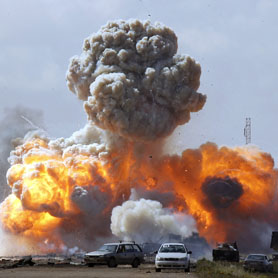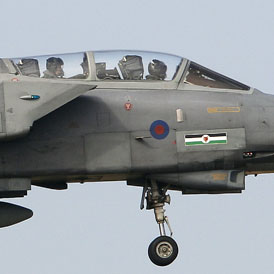Libyan rebels: NATO failing civilians
The Libyan rebel commander accuses NATO of slow decision making, which is “letting the people in Misrata die every day”.

The head of Libya’s rebel army General Abdul Fattah Younis said rebels were considering referring NATO to the UN Security Council, accusing them of being too slow to order air especially in the besieged western city of Misrata.
“NATO blesses us every now and then with a bombardment here and there, and is letting the people of Misrata die every day,” the former Interior Minister said
Read more Libya war: interactive video timeline map
“Civilians are dying daily because of lack of food or milk, even children are dying. Even by bombing. If NATO waits for another week, it will be a crime that NATO will have to carry. What is NATO doing? It is shelling some defined areas only,” he said.
“When a large force of tanks, and even artillery, is on its way to Benghazi, Ajdabiya or Brega, we always inform NATO straight away. Because we don’t have such weapons. NATO’s reaction is very slow. By the time the information reaches from one official to another until it reaches the field commander, it takes hours.
Misrata was subjected to heavy barrages of tank fire, artillery and mortars on Tuesday, killing two people and injuring 26 according to the rebels.
NATO said the pace of air strikes targeting Gaddafi’s military infrastructure has not slowed down since it took over control of the operation on March 31st.
Read more Libya war: strike against Gaddafi
Misrata ‘number one priority’
Earlier in the day, Brigadier General Mark van Uhm, NATO’s chief of allied operations, said that NATO’s new “number one priority” was Misrata.
“Misrata is a number one priority because of the situation on the ground over there. We have confirmation that in Misrata tanks are being dispersed, being hidden, and humans being used as shields in order to prevent NATO sorties to identify targets,” he said.
Overall he estimated just under a third of Gaddafi’s military capacity had been disabled, although the regime had adapted its tactics to make operations more difficult for the alliance.
Van Uhm said Gaddafi was using human shields and hiding his armour in populated areas, curbing NATO’s ability to strike. “When human beings are used as shields we don’t engage.”
Renewed offensive
Earlier on Tuesday, Libyan rebel forces abandoned the oil town of Brega and headed east toward Ajdabiya in the face of a renewed offensive by troops loyal to Muammar Gaddafi.
Intense fighting forced the rebels to retreat just a day after rebels had taken over a residential part of the city.
Opposition forces said they came under rocket and artillery fire while they attempted to fight back with mortars and rockets of their own.

One rebel fighter in Brega said NATO was to blame: “Since the day NATO took over the air strikes, we have been falling back,” said Ziad el Khafiefy
Rebel oil
But the rebels are set for a strategic boost with the arrival of a tanker in the rebel held port of Tobruk, allowing the resumption of oil exports with the first rebel shipment since the fighting broke out. Capable of carrying up to one million barrels of crude, worth more than $100 million, this would help the rebel leadership to pay salaries and improve its image as a potential government capable of running Libya in the future.
The last oil shipment to leave Libya was on March 18.